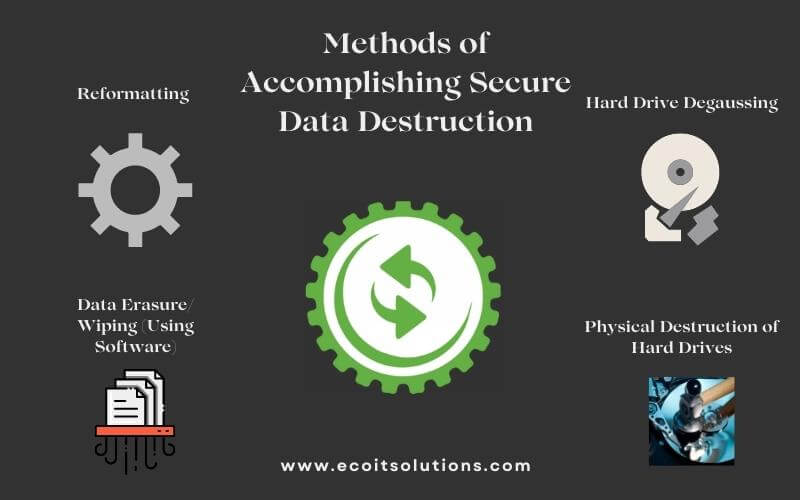The Necessary Nature of Information Destruction in Upholding Computer Safety Solutions and Protecting Versus Unauthorized Access
In a period where information breaches and identity burglary are significantly common, the value of effective information destruction can not be overstated. Numerous techniques, from information wiping to physical destruction, offer as essential safeguards versus unapproved gain access to.
Relevance of Data Destruction
In an increasingly digital globe, the relevance of information damage can not be overemphasized. As organizations accumulate substantial amounts of sensitive info, the potential effects of stopping working to properly dispose and handle of that information end up being significantly serious. Data violations, identification burglary, and corporate espionage present considerable risks, underscoring the need of efficient information destruction methods.

Additionally, as technology progresses, so as well do the approaches through which harmful stars look for to exploit delicate info. Organizations should stay cautious and proactive in their data damage techniques to secure against these developing risks. By prioritizing data devastation, companies not just secure their properties but additionally foster count on among clients and stakeholders, demonstrating a dedication to liable information management and security practices.
Techniques of Effective Information Devastation
To ensure the permanent and complete devastation of sensitive data, companies can utilize a variety of efficient approaches customized to their details needs. One of one of the most typical methods is data cleaning, which involves making use of specialized software program to overwrite existing information numerous times, making recuperation basically difficult. This is particularly helpful for solid-state drives and difficult drives, where traditional removal methods are poor.
An additional efficient approach is degaussing, which uses strong electromagnetic fields to interfere with the magnetic domains on storage space media, rendering the data irretrievable. This technique is especially fit for magnetic storage space gadgets, such as disk drive and hard drives.
Physical damage is also a viable option, entailing the shredding, crushing, or incineration of storage space devices. This method warranties that information can not be recovered, making it perfect for organizations taking care of highly delicate info.

Conformity With Data Protection Rules
Organizations have to not only concentrate on effective information damage approaches but additionally guarantee compliance with data defense policies that govern exactly how delicate information is handled and thrown away. Complying with these policies is necessary for keeping and securing individual data customer count on. Regulations such as the General Data Protection Guideline (GDPR) in the European Union and the Medical Insurance Mobility and Accountability Act (HIPAA) in the USA enforce stringent guidelines on data management, that include demands for the protected disposal of sensitive details.
To accomplish compliance, organizations must apply thorough information devastation policies that straighten with these legal frameworks. This consists of identifying data that requires damage, establishing protocols for protected methodsâEUR" such as shredding physical media or utilizing software application that satisfies industry criteria for data wipingâEUR" and keeping detailed documents of damage tasks. Normal audits must be carried out to guarantee adherence to these plans and to identify any prospective locations for renovation.
Failing to abide by data protection policies can result in considerable legal implications, including substantial fines and damages to an organization's reputation. Incorporating compliance into data destruction practices is not just a lawful obligation yet likewise a critical element of a robust information safety and security approach.
Consequences of Poor Data Handling
Poor information handling can lead to serious effects that expand beyond instant functional problems. Organizations may face considerable monetary losses due to data breaches, which usually cause pricey removal efforts, legal fees, and regulative penalties. These economic effects can impede and stress sources development, inevitably influencing a company's bottom line.
Additionally, inadequate information handling can significantly harm an organization's online reputation. Partners, stakeholders, Check Out Your URL and customers might shed trust in an entity that fails to protect delicate details, bring about lowered consumer commitment and prospective loss of service chances. This erosion of trust can take years to rebuild, if it can be recovered in all.
In addition, companies might face legal implications emerging from non-compliance with information security regulations. Such infractions might lead to fines and examinations, intensifying the financial burden and more tainting the organization's photo.
In the realm of cybersecurity, inadequate information administration methods can create susceptabilities that make systems extra prone to unapproved gain access to and cyberattacks. Ultimately, these effects highlight the important value of executing durable data dealing with procedures to guard delicate information and my sources keep organizational honesty.
Finest Practices for Secure Data Disposal


Firstly, information must be categorized according to its level of sensitivity. Sensitive info calls for more extensive disposal approaches, such as shredding physical documents and utilizing innovative software program for electronic information wiping. Using certified data damage services makes sure conformity with sector laws and criteria.
Second of all, companies need to apply an information disposal plan that mandates routine audits. This plan should describe the treatments for data retention and destruction, guaranteeing that outdated data is thrown away without delay and firmly. Educating workers on these procedures is necessary to promoting a society of safety understanding.
Last but not least, maintaining detailed documents of disposed information improves responsibility and offers a clear audit trail. This documentation should consist of the sort of information ruined, the technique used, and the date of disposal.
Verdict
In verdict, the important of effective information devastation is noticeable in its duty in enhancing computer security solutions and alleviating unapproved gain access to risks. Taking on durable techniques such as information wiping, degaussing, and physical destruction, together with compliance with policies like GDPR and HIPAA, is essential for securing sensitive information. Ignoring proper information disposal practices can bring about serious effects, consisting of information breaches and lawful consequences. Applying finest techniques in safe and secure information disposal ultimately strengthens business stability and customer trust.
In an era where data violations and identity burglary are increasingly common, the significance of content efficient information damage can not be overemphasized. data destruction. Data violations, identification theft, and company espionage position substantial threats, highlighting the need of effective information devastation practices
Compliance with regulations such as GDPR and HIPAA requireds that organizations implement rigorous data protection measures, consisting of the safe and secure devastation of information at the end of its lifecycle.
By focusing on information damage, business not just shield their properties but also foster trust among stakeholders and clients, demonstrating a dedication to liable information monitoring and safety techniques.
Organizations have to not just focus on effective information damage approaches but also guarantee compliance with data protection policies that govern just how delicate information is handled and disposed of.